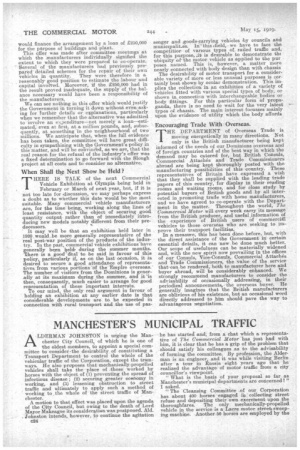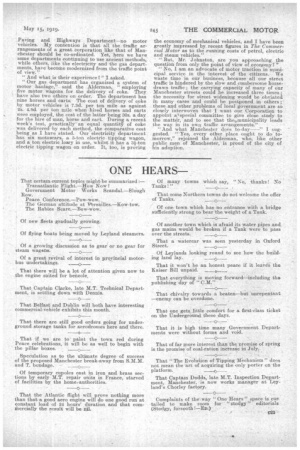MANCHESTER'S MUNICIPAL TRAFFIC
Page 2

Page 3

If you've noticed an error in this article please click here to report it so we can fix it.
ALDERMAN JOHNSTON is urging the Manchester City Council, of which he is one of the oldest members, -Co appoint a special committee to consider-the desirability of constituting a Transport Department to control the whole of the vehicular traffic of the Corporation, except the tramways. He also proposes that mechanically-propelled vehicles shall take the place of .those worked by horses with the object of (1) preventing the spread of infectious disease ; (2) securing .greater economy in working, and (3) lessening obstruction to street traffic and ultimately to apply such a method of working to the whole of the street traffic of Manchester.
A motion to that effect was placed upon the agenda of the City Council, but owing to the death of Lord Mayor 1VIakeague its consideration was postponed. Ald. , Johnston intends, however, to continue the agitation 024
he has started and, from a chat which a representative of The Commercial Motor has just had with him, it is clear that he has a grip of the problem that should satisfy his colleagues as to the advisability of forming the committee. By profession, the Alderman is an engineer, and it was while visiting Berlin after a tour in Russia eight years ago that he realized the advantage of motor traffic from a city councillor's viewpoint. " What is the basis of your proposal so far as Manchester's municipal departments are concerned?" I asked.
"The Cleansing Committee of our Corporation has about 400 horses engaged in collecting Street refuse and depositing their own excrement upon the , thoroughfares. The only mechanically-propelled vehicle in the service is a Lacre motor streete sweeping machine. Another 50 horses are employed by the Paving and Highways Department—no motor vehicles. My contention is that all the traffic arrangements Of a great corporation like that of Manchester should be co-ordinated. Yet, here we have some departments continuing to use ancient methods, while others, like the electricity and the gas departments, have become modernized from the traffic point of view."
"And what is their experience?" Tasked. "Our gas department has organized a system of motor .haulage,' said the Alderman, "employing five motor wagons for the delivery of coke. They have also two others on order. The department has nine horses and carts. The cost of delivery of coke by motor vehicles is 7.3d. per ton mile as against 2s. 4.8d. per ton mile when hired horses and carts were employed, the cost of the latter being 30s. a day for the hire of man, horse and cart. During a. recent week's test, practically an equal quantiq of coke was delivered by each method, the comparative cost being as I have stated. Our electricity department has six motonars, a 5-ton electric tipping wagon, and a ton electric lorcy in use, whilst it has a 3-i-ton electric tipping wagon on order. It, too, is proving the economy of mechanical vehicles, and I have been greatly impressed by recent figures in The Commercial Motor as to the running costs of petrol, electric and steam vehicles."
"But, Mr. Johnston, are you approaching the question from only the point of view of econpiny? " "No, I am an advocate of motor traction in m-unicipa.1 service in the interest of the citizens. We waste time in our business, because all our street traffic is hindered by the slow and cumbersome horsedrawn traffic ; the carrying capacity of many of our Manchester streets 'could be increased three times ; the necessity for street widening would he obviated in many cases and could be postponed in others ; these and other problems of local government are so closely interwoven that I want our Corporation to appoint especial committee to give close study to the matte'r, and to see that theamunicipality leads the way in its own traffic arrangements." "And. what Manchester does today—& I suggested. "-Yes, every other place ought to do. tomorrow," rejoined the Alderman, who, like other public men of Manchester; is proud of the city of his adoption.






















